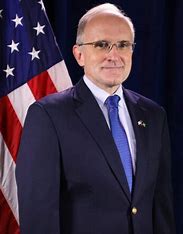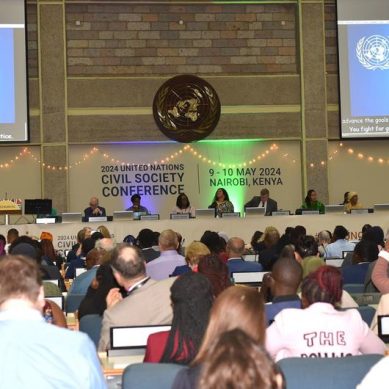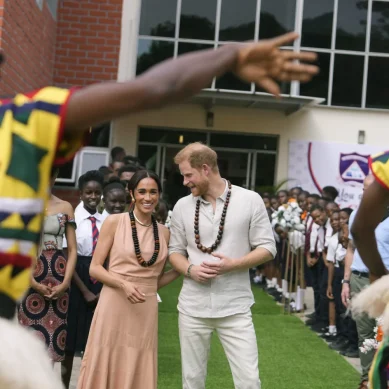
he Global Coalition to Defeat Daesh/ISIS has established a focus group to help African states build up their counterterrorism capabilities, particularly for regions where governance challenges have allowed extremist organisations to exploit economic deprivation and a lack of effective governance.
Ian J McCary, the US Department of State’s Bureau of Counterterrorism’s Deputy Special Envoy (DSE) for the Global Coalition to Defeat Daesh/ISIS, gave more detail on this and other counterterrorism matters in a one-on-one interview with White House correspondent Pearl Matibe after the recently concluded 78th UN General Assembly meetings.
Here is an excerpt of the interview, lightly edited for length and clarity:
Matibe: The common belief is that ISIS-CORE based in Syria and Iraq has lost its capacity and is a defeated organisation. However, the State Department’s annex of statistical information reported 645 ISIS incidents in 2021. In 2022, it was 535, according to Global Terrorism Trends and Analysis Centre (GTTAC) data. Considering the high number of ISIS incidents and fatalities recorded in these attacks, how would you assess the fight against ISIS? Is it your assessment that ISIS is now a defeated organisation?
McCary: No, I don’t think I have ever said that ISIS is a defeated organisation. It does obviously continue to create problems and pose challenges in northeast Syria and Iraq. And in several other parts of the world. But it’s worth also taking stock of how much progress has been made in the campaign against ISIS and if you compare where they are now, to where they were, say, in 2015, or 2016. The contrast is very dramatic. Back then of course, they controlled the vast swathes of territory from Mosul to Ar Raqqa, stretching down towards Tadmur stretching down towards Baghdad and into Fallujah, or that area. And today, they don’t control any territory whatsoever in that region. They have been substantially defeated. Tens of thousands of their fighters were taken off the battlefield.
Thousands of them are in detention. And like I said, they do not control any territory. They do retain a capability to conduct attacks on some small scale. And I think that would be in line with the statistics that you’re citing. And so, you know, we do not take it for granted at all. We do not consider this fight to be over in northeast Syria and Iraq. The principal challenge right now is one of stabilisation and addressing the humanitarian concerns that remain there. We are focused on implementing stabilisation projects, rebuilding community infrastructure, assisting families that were displaced during ISIS’s occupation, with building new lives, restoring services in the communities that they were forced out of, and also helping as many people as possible who have been living in these displaced persons camps, to leave the camps, return to their original locations, and rebuild their lives. And we work closely with international partners, working closely with the Government of Iraq to help make those goals a reality.
Matibe: So, after losing power in Iraq and Syria, ISIS has created regional branches affiliated with organisation. These groups were the perpetrators of more than 1,300 terrorist attacks in 2022. As I said…ISIS branches in the Sahel, Mozambique, the Democratic Republic of the Congo, Afghanistan, and Nigeria, seem to be the most violent and active ones from the perspective of The Global Coalition to Defeat ISIS. Which regional ISIS branches should get a closer look and a magnified lens, particularly in Africa?
McCary: Yeah, well, we are certainly focused on all of those areas that you mentioned. We’re particularly focused on the situation in the Sahel and West Africa, where, as you rightly said, we’ve seen in recent years, a number of criminal gangs and organisations, and sort of miscellaneous militias formally adopt ISIS ideology, and seek to use that brand to enhance their own prestige. And so, we have – within The Global Coalition – established a focus group of stakeholder countries, principally with an emphasis particularly on African states themselves, working closely with our African partners, to help them build up their own counterterrorism capabilities so that they can defend their publics, and defend their sovereignty against threats posed by violent extremist organisations, including some self-identified affiliates of Daesh or ISIS in that region.
Matibe: And, as you rightly mentioned, we do see how jihadist groups compete, with each other — to be under the banner of ISIS or Al Qaeda in Africa, for example — aiming to get more resources and benefits from ISIS’s popularity. Ansar al-Sunna in Mozambique and Allied Democratic Forces in the DRC are, today, ISIS’s regional branches. And because of their violent attacks, these two groups are now on the US FTO (Foreign Terrorist Organisations) list. Do you think states in Africa that lack government resources and grapple with endemic corruption can effectively counter ISIS regional branches? What should The Global Coalition to Defeat ISIS do against ISIS’s increasing presence and influence in Africa?
McCary: In Africa? Yeah, well, let’s be honest. There are serious governance challenges in various parts of Africa. And there are many regions and different countries in Africa that don’t enjoy the effective delivery of government services. And what we’ve seen in these areas is that this creates conditions where you have conditions of economic deprivation, other factors, and a lack of effective governance. We see other actors move in and seek to exploit that void. So, that is certainly part of the reason we’ve seen the appearance, or growth of these groups, in the areas that you mentioned. So obviously, working with governments to enhance their ability to deliver services to their citizens, providing schools, hospitals, basic infrastructure, roads, electricity, and the like; that is certainly part of the long-term solution. That’s a bigger challenge than The Global Coalition can take on by itself. The Global Coalition is specifically focused on helping African states build up their counterterrorism capacities, but we’re also constantly coordinating with other parts of the US government and development agencies in other areas – or in other partner countries – to see what we can do also to address the broader challenges.
The Global Coalition is a broad coalition. We have 87 members that bring all kinds of capabilities. We are evolving, as the threat is evolving. And we are focused on the threat, as it emerges and evolves in various parts of the world. And we are bringing to bear the strengths of our different coalition partners in each area to address this challenge effectively.
- A Tell report / Pearl Matibe is a Washington, DC-based foreign correspondent and media commentator with expertise on US foreign policy and international security.











